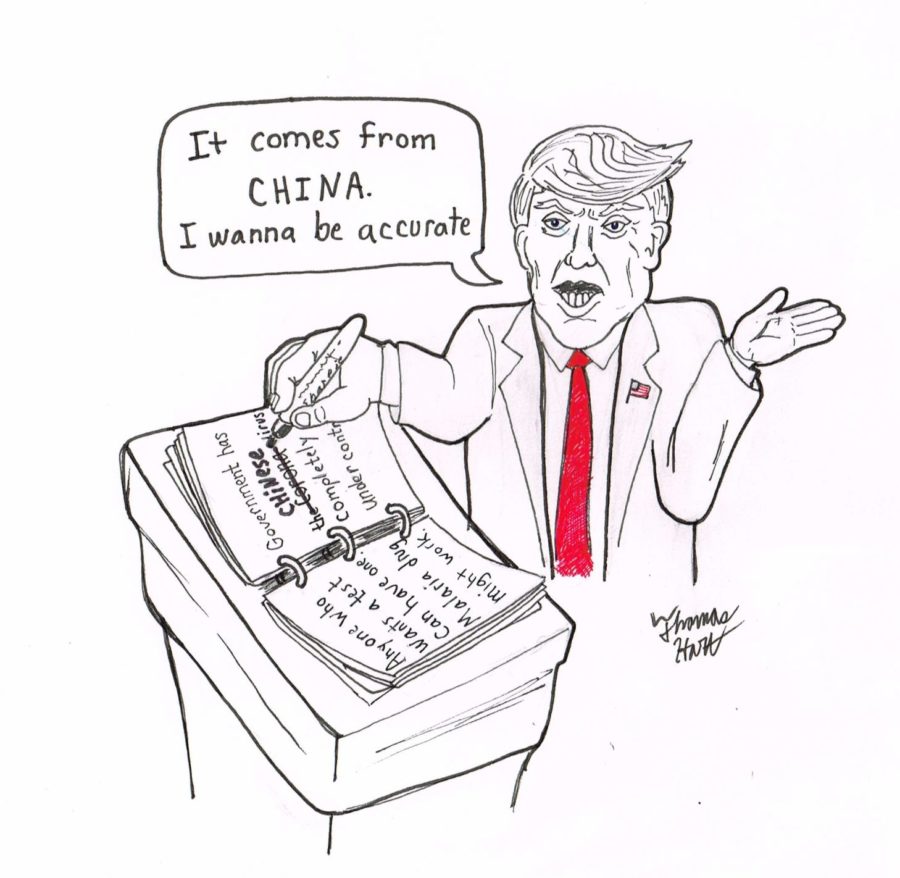Wash your hands, avoid crowds, and please, don’t call it the ‘Chinese Virus’
March 25, 2020
Yes, the novel coronavirus appears to have originated in China. But call it by its official names.
In the past week, President Donald Trump has been scrutinized for his recent shift to referencing COVID-19 as the “Chinese virus” during press conferences. This has sparked a cascading set of reactions from the public: accusations that this kind of language increases xenophobia and fear across our communities, defenses of the president due to the geographical origin of the virus and arguments that China should shoulder blame due to its mishandling of the situation.
Others believe that this move is purely political, shifting negative sentiments towards China as opposed to spotlighting the current administration’s struggles to deal with the consequences brought on by coronavirus.
Motivations aside, in these confusing, uncertain and already quite lonely times, using this kind of ostracizing language is unacceptable. Singling out Asian people distracts from the crisis and only serves to further fracture our communities.
From the moment that news of the coronavirus spread to the U.S., reports of Asian Americans facing harassment, name calling and ostracism have unfortunately become commonplace. A New York Times article from last month recounted personal stories of Asian Americans who received suspicious glares for wearing masks in public or whose single sneeze sent people scuttling away. Before cases were even confirmed in Florida, parents reported verbal attacks and bullying towards their Asian children, who were perceived to be Chinese and carrying coronavirus. A viral video shows a man on the New York subway yelling for an Asian to “move” and then thoroughly spraying the area (and person) with Febreze. A simple internet search results in a terrifyingly endless supply of these examples.
But what does referring to coronavirus as the “Chinese virus” have to do with these xenophobic actions reported across America? While it is true that historic diseases have been named after its place of origin (such as West Nile virus), in 2015 the World Health Organization revised its guidelines to discourage this naming practice as it has been shown to stigmatize impacted communities. Our president is using language that is perceived by many Asian people as racially charged, and yet repeatedly claims the term is not racist.
The attitude of a country is, in many ways, reflected by its leadership. All eyes are on a President who has repeatedly denied his own clear racism, and for some, this will only serve to confirm and encourage their own prejudiced actions. Our leadership should never partake in activities that further racial divides in our country, but the actions of our administration are especially damaging in the delicate times we currently face.
In the words of Governor Andy Beshear, this is an unprecedented time in which the world has been told not to come together in the face of uncertainty, but to stay apart.
As a half-Korean myself, this situation feels personal. Life as an Asian American is already complex in terms of identity, and my heart aches knowing that feelings of “otherness” have only intensified for many Asians during this crisis. We don’t need to further divides across our borders and within our own country.
Now is not the time to target Asian people or attempt to continually shift the blame. The coronavirus threatens all of us—not just Asian people—and our actions need to reflect unity.























































































































































